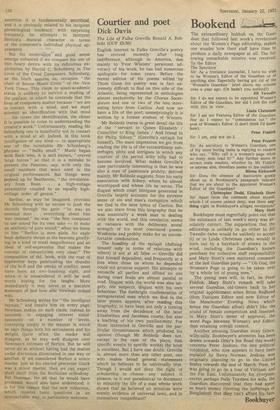Courtier and poet
Dick Davis
The Life of Fulhe Greville Ronald A. Rebholz (OUP £5.50) English interest in Fulke Greville's poetry has revived recently after long indifference, although in America, due mainly to Yvor Winters' persistent advocacy of his work, he has had numerous apologists for some years. Before the recent edition of his poems edited by Thom Gunn his poetry was in fact extremely difficult to find on this side of the Atlantic, being represented in anthologies almost exclusively by the Chorus Sacerdotum and one or two of the less interesting lyrics from Caelica. And now we have a life of the poet; unsurprisingly it is written by a former student of Winters Mr Rebholz traces in great detail the life of the "servant to Queen Elizabeth" / Councillor to King James / And friend to Sir Philip Sidney," (Greville's epitaph for himself). The main impression we get from reading the life is of the extraordinary subterfuges, plots and intrigues in which any courtier of the period willy nilly had to become involved. What makes Greville's case particularly interesting is that he was also a man of passionate probity, derived mainly, Mr Rebholz suggests, from his early association with Sidney, whom he almost worshipped and whose life he wrote. The disgust which court intrigues generated in Greville largely accounts for the extreme sense of sin and man's corruption which we find in the later lyrics of Caelica. But we also learn from this biography that he was essentially a weak man in dealing with the world, and this revelation seems at variance with the deliberate moral strength of his most convinced poems. Weakness and probity make for an uncomfortable combination.
The humility of the epitaph (defining himself only in terms of relations with others) is not at all false — Greville did feel himself dependent, and frequently at a loss when those on whom he depended could not promise support. His attempts to reconcile all parties and offend no one during court feuds are almost painful to read. Disgust with the world was also largely, one suspects, disgust with his own behaviour. The forthright condemnation of unregenerated man which we find in the later poems appears, after reading this biography, to have been not only a turning away from the decadence of the later Elizabethan and Jacobean courts, but also a loathing of his own pusillanimity. For those interested in Greville and the particular circumstances which produced his opinion (though Mr Rebholz does not, except in the case of the plays, link specific events to specific works) the book is excellent. But I have one doubt: Greville is, almost more than any other poet, one who makes broad general statements which he believes to be universally true. Though I would not deny the right of scholarship to choose any subject it pleases, is it not paradoxical to document so minutely the life of a man whose work shows that he believed all minutiae were merely evidence of universal laws, and in themselves insignificant?










































 Previous page
Previous page